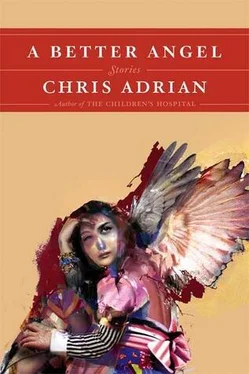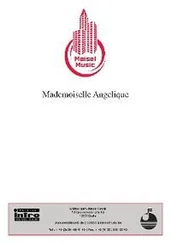“Put that lady and her evil children behind you,” she said, not looking up as I swept by her. She did not like Mrs. Fontaine for the obvious reason but what she had against her two kids I could not figure, though she has always done that, pointed out the ones that will grow into car thieves or lottery-fixers or murderers, as if I am supposed to smother them with the great pillow of righteous prevention when they are six months old.
The Fontaines were waiting patiently in the exam room, Zebadiah splashing at the sink while his mother fed his sister and his aunt read Highlights . “Hey, everybody!” I said, and I locked the door. Zebadiah toddled over to check it, innocently part of our enterprise. “Baby,” said Mrs. Fontaine, meaning me and not her son, “how have you been?”
“It’s been a rough day,” I said.
“Well, your friend has got just the thing for a rough day,” she said, and, taking a little foil-covered package from her diaper bag, she laid it upon the counter near the sink, and that is all we said about it because one of our terms of business is a nearly silent sort of discretion. I put down my envelope and she took it, and when her package was in my pocket, then we talked about her babies. Her sister did a find-the-picture puzzle while we talked, interrupting us to ask, “Where is the boot?” and “Do you see a flute?” I said I didn’t know, and she said I must not be very smart if I couldn’t find the flute hidden in the tree.
“If you already knew where it was, then why were you asking?” Mrs. Fontaine said, and her sister lowered her lids to half-mast and said, “I was testing him.” And then she laughed, like that was the funniest thing in the world. I examined Zebadiah and then his sister, Lily, who was just four months old, fat and happy, and singing wordlessly as I listened to her heart and fiddled with her hips. The angel paced in the confines of the room, the cats going squish and squash as she stepped, and Lily seemed to be watching her. “A fire from heaven should come down right now,” she said. Though the medicine was only in my pocket, just having it near made it easy to ignore her.
“She’s beautiful,” I said to Mrs. Fontaine.
“She’s all right,” she said, ducking her head and smiling, and her sister reached out to take the baby and hold her a moment and proclaim that she was indeed a beautiful girl, and then she handed her to her mother, who handed her to me, and then without knowing why I handed her back to the sister. Sometimes it just happens like that, something entirely bearable, the baby smiling and laughing and going round and round, from hand to hand to hand, and her brother shouting, “I’m beautiful, too!” and lifting his arms to be picked up, and all five of us laughing while the angel scowled impotently. I wanted it to go on forever.

“Does everybody get an angel?” I asked her one day, about a month after I met her, when it finally occurred to me to wonder if every boy and girl had a guiding spirit invisible to me. I looked around my first-grade class, squinting to see them, the girls in jumpers standing next to the seated girls in jumpers, the boys in blue pants, looking so ordinary except for their immaculate posture and drooping folded wings.
“Only the ones who will be great, or do great things. And sometimes being great is enough. The great things go out, generated as easily as thought or love. Do you understand?” I cannot describe how gentle her voice could be in those days.
“No,” I said. So when we got home she guided me to my father’s library, ignoring my pleas not to enter there without his permission, and sat me down in front of the encyclopedia. I opened a book to random pages and she marked with her finger the men and women who had warranted an angel to guide them into their greatness. There were fewer than I expected, and as many who were greatly bad as greatly good. I flipped backwards through the A’s, only familiar with one in ten of the names she touched, making the letters shine in a way I could see forever after. Attila I knew, having just heard of him in history, and taken part in a little skit where I dressed up in my mother’s unused furs and shouted at the head of the class with five other boys and the girl whose long black hair had landed her the part of the Hun. “But he was bad,” I said, and she said that not everybody listened to their angel.
I hate adult hospitals, and adult medicine, and adult patients. I could not wait to get away from them in medical school, from their aching lower backs and chronic depression and get-me-out-of-work — related injuries. I hated especially the little old ladies with their parchment faces and frail broken hearts, who’d die if you frowned at them. Even a half-dead preemie is more resilient. And I hated the smell of the place — children are not so smelly to begin with, and even as they get sick or die they do not give off that odor that fills up adult hospitals, and seems to blow out of the angel’s wings when she shakes them in agitation. It always seemed to cling to me after a particularly egregious fuck-up in medical school, so for days afterward just by sniffing at my fingers I would be reminded of how I almost killed this or that poor old zombie with my bad math.
The angel seemed to like the place, but then she is pleased by death, or at least it seems to get her excited the way that doughnuts or handsomeness do for me. She was always making a show of sniffing at people and predicting the hour of their demise. It became the only thing I was good at, distinguishing the really sick ones from out of the confusing daily crowd of patients that was presented to me as a student, and then as a resident, though I never could remember how to save them. As we walked to see my father in his room, for the first time she had a spring in her step, and though she was dressed still as a bag lady, she’d replaced her cats with tissue boxes, and shined her wings, and put on an elegant, if very dirty, hat. It might have been the hospital or just the fact that I had come that made her happy. To her mind I had done the right thing, and so she had taken it easy on me all during the trip, and now she bounced along like a schoolgirl. I think she would only have been happier if I killed myself.
The nurses at the station did not look up when I walked past on the way down to the end of the hall, where my father had his room, or when I hurried by again, fleeing from him. “Here he is,” the angel said when I walked in — she’d run ahead the last few feet and passed through the wall. And she gestured over him like he was a new car or a sexy motorcycle in a showroom. When I saw him last he was the same dour, black-eyed man I’d known unchanging all my life, my six-foot-four, imperious, responsible reflection, a man who I always knew should have had an angel of his own. Now he was laid out diapered in a dirty bed, as bald and toothless and somehow as grand as Aslan on his table. He looked up at me when I walked in and said, by way of greeting, “You!” and managed to invest the word with equal measures of disappointment, accusation, and surprise. I dropped my book and candy box and ran out.
I always feel at home in a bathroom. Some nights as a resident I would withdraw into one and leave the intern to flounder and drown, claiming later that I never got the frantic pages when in fact I had turned off the pager and was sitting on the toilet with my face in my hands or taking little hits of whatever I was really into that month. There was a bathroom near the elevator on my father’s floor of the hospital, a nice one-person arrangement with a lock on the door.
A locked door or a feeling of really needing to be alone is no deterrent to the angel. She was there in just a few moments — I never know what delays her, when she can travel at the speed of guilt and sometimes seems to be everywhere at once. She berated me while I hid my face in my hands, her voice making the little room seem very full, all the what do you think you’re doing ’s and you get back there ’s seeming to bounce off the white walls in discrete packages of sound. I am not this sort of doctor, I said to my hands. I am not any sort of doctor, and I don’t know what to do about what’s back there in that room. And she said that even if you are the sort of doctor who doesn’t know anything about medicine, and even if you only passed your certifying exams because you paid a certain Dr. Gupta to bypass the pathetic security measures taken by the American Board of Pediatrics against cheats and impostors, even you can recognize a patient at the extremes of abandonment and grief, even you can do the smallest human thing to improve his lot.
Читать дальше













